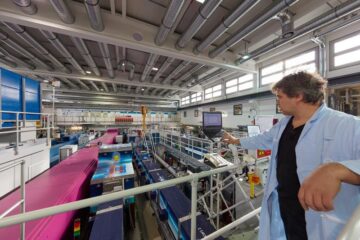Novel ‘Delivery’ Method For Nutrients Wins Kaye

Innovation Award For Hebrew University Students
Increasingly, the public wants to “eat healthy,” consuming foods that are high in the nutrients that are considered beneficial. The problem is that many of these food components are ultimately ineffective.
This is so because most bioactive phytochemicals (chemical components derived from plants) are not soluble in water, and therefore their absorption via the digestive system is very limited. In plain terms, the beneficial components simply pass through our bodies.
In order to solve this problem, two Ph.D. students at the Hebrew University of Jerusalem have contributed to the development of “nanovehicles” that can successfully transport the desired components through the digestive system. For their successful work, the two students, Aviram Spernath and Idit Yuli-Amar are first-prize student winners of this year’s Kaye Innovation Awards at the Hebrew University, which were presented on June 8 during the 67th meeting of the uiversity’s Board of Governors.
Spernath and Yuli-Amar have been working under the supervision of Prof. Nissim Garti and Dr. Abraham Aserin at the Hebrew University’s Casali Institute of Applied Chemistry in developing nanodroplets and tiny liquid crystals that are effective in binding with, dissolving, stabilizing and retaining food or medicinal chemicals, thereby creating microemulsions. The vehicles are built using complex formulations involving emulsifiers, water, oil and alcohol.
These nanodroplets or liquid-crystals, each bearing the desired bioactive chemicals, can be incorporated into liquid or solid food, capsules, powders or tablets. The vehicles’ retentive qualities and nanostructure enable them to be successfully absorbed through digestive membranes. The method has significant health implications for both better nutrition and medical treatment.
Spernath, 35, who lives in Kfar Saba, and Yuli-Amar, 28, of Jerusalem stress that their specially formulated vehicles can successfully entrap and transport nutrients dissolved in nanodroplets or liquid-crystals that are 95 percent water. The current direction of their research is aimed at developing vehicles that are exclusively water-based, without the need for an alcohol component.
The work carried out in Prof. Garti and Dr. Aserin’s laboratory at the Casali Institute has been further developed commercially through an Israeli company, NutraLease, started in cooperation with the Hebrew University’s Yissum Technology Transfer Company. One result has been the production and sale in food markets of a nutritionally-enhanced canola oil product.
The Kaye Innovation Awards have been given annually since 1994. Isaac Kaye of England, a prominent industrialist in the pharmaceutical industry, established the awards to encourage faculty, staff, and students of the Hebrew University to develop innovative methods and inventions with good commercial potential which will benefit the university and society.
For further information: Jerry Barach, Dept. of Media Relations, the Hebrew University, Tel: 02-588-2904. Orit Sulitzeanu, spokesperson, 5882910, 052-608016
Media Contact
Alle Nachrichten aus der Kategorie: Förderungen Preise
Neueste Beiträge

Bakterien für klimaneutrale Chemikalien der Zukunft
Forschende an der ETH Zürich haben Bakterien im Labor so herangezüchtet, dass sie Methanol effizient verwerten können. Jetzt lässt sich der Stoffwechsel dieser Bakterien anzapfen, um wertvolle Produkte herzustellen, die…

Batterien: Heute die Materialien von morgen modellieren
Welche Faktoren bestimmen, wie schnell sich eine Batterie laden lässt? Dieser und weiteren Fragen gehen Forschende am Karlsruher Institut für Technologie (KIT) mit computergestützten Simulationen nach. Mikrostrukturmodelle tragen dazu bei,…

Porosität von Sedimentgestein mit Neutronen untersucht
Forschung am FRM II zu geologischen Lagerstätten. Dauerhafte unterirdische Lagerung von CO2 Poren so klein wie Bakterien Porenmessung mit Neutronen auf den Nanometer genau Ob Sedimentgesteine fossile Kohlenwasserstoffe speichern können…





















